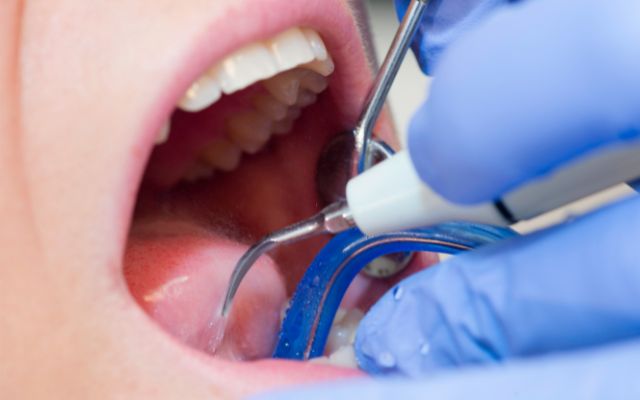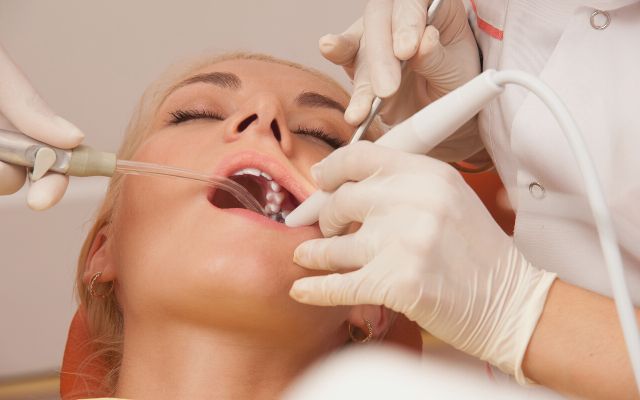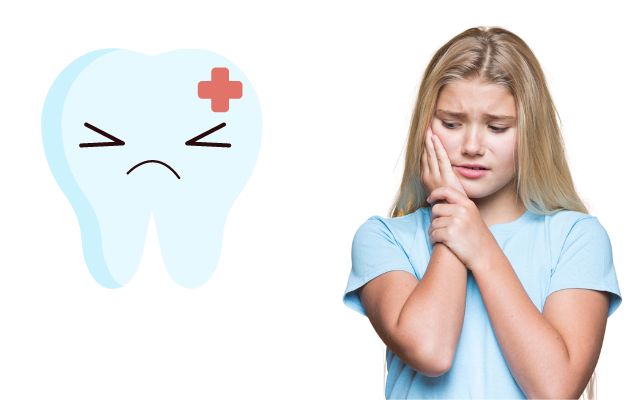Dental Trauma
Dental trauma: A severe injury to one or more elements of the mouth, including damage to teeth, tooth sockets, tooth roots, and the jaw. Are you suffering dental trauma?
Keep reading to know more about causes, signals as well as guidelines to treat effectively.
What is Dental Trauma?

Dental trauma is a severe injury to one or more of the mouth’s structures. Your injury could affect your teeth, tooth socket, tooth root, or jaw. Injuries to soft tissues, such as the tongue, cheeks, gums, and lips, are also possible. Extreme trauma can expose the pulp within the tooth.
Dental trauma is an injury to the teeth, gums, alveolar bone (the bone that contains the tooth sockets), or soft tissues of the mouth, such as the lips and tongue. Several forms of injuries fall under the category of dental trauma, including the ones listed below:
- Cracked tooth
- Fractures of teeth, such as root fractures, enamel fractures, etc.
- Tooth knocked out of place (subluxation)
- Tooth wedged in place (intrusion)
- Tooth extraction (avulsion)
- Wall of the tooth socket fracture
- Chin fracture
- Papular lesions of the lips
- Inflammation of the gums
Common Symptoms of Dental Trauma
- A tooth that is broken, chipped, loose, misaligned, or is absent.
- A tooth with a sharp or jagged edge
- Gums, lips, face, and mouth that bleed excessively
- Difficulty moving the jaw or mouth
- A modification to how your teeth come together when you close your mouth.
What are The Reasons For Dental Trauma?
Accidents, such as falls, automobile crashes, and participation in sports, are the leading cause of oral trauma. Some cases are the result of violent behavior, such as fighting or physical abuse, dental injuries.
Dental Trauma Treatments

The treatment varies according to the type of the trauma. A dentist should check injuries to the mouth and teeth, especially if one or more teeth have become loose or been damaged.
In some instances, when a tooth is clearly damaged, the adjacent teeth may also have injuries that are not necessarily visible without a dental examination.
- For fractured or chipped teeth, tooth-colored fillings may be prescribed to replace the missing tooth structure. If a substantial portion of the crown has been lost, an artificial crown or cap may be recommended as an alternative.
- If the pulp is exposed, you may need root canal therapy.
- Back teeth injuries, such as fractured cusps, may necessitate a root canal and full-coverage crown.
- More severe damage, such as cracked teeth, may necessitate total tooth extraction.
- The dentist must stabilize dislodged (luxated) teeth, and root canal therapy may be required.
- If the tooth can be located, handle it by the crown and avoid touching the root. After placing the tooth back into its socket and applying a stabilizing splint for a few weeks, the dentist may recommend root canal therapy.
- Tooth replacement option.
- As their teeth are still developing and may be able to heal on their own, children under the age of 12 may not require root canal therapy. The dentist will closely monitor them to see if any treatment is required.
- If you act soon, teeth that have been knocked out (avulsed) can be replaced. You should visit your dentist or an endodontist promptly.
If you obtain treatment within 30 to 40 minutes, there is a good possibility that you can save the tooth.
If you wait longer than this, the chances of saving the tooth reduce significantly.
Type of specialist treats Dental Trauma
- Locate the maximum amount of the tooth. Keep the tooth by its crown (top): radiographic examination, canal treatment, dental injury, permanent teeth, periodontal ligament, permanent tooth
- Use cold water to swish the teeth.
- The tooth can be replaced in its entirety. The tooth should be pushed in firmly, but not forcibly. Ensure that the tooth is in place by biting carefully many times.
- It is crucial to get the tooth or tooth fragments to your dentist as soon as possible. Do not bring it dry. Place the affected tooth in milk, egg whites, coconut water, or salt water. After spitting into a cup, you can also use your saliva. Do not use tap water.
Manage Dental Trauma Guidelines

- Apply ice for 15 to 20 minutes every hour or as instructed. Use an ice pack or a small bag with crushed ice. Cover it with a towel before applying. Ice prevents tissue damage and reduces inflammation and pain.
- Do not utilize your broken teeth. Chewing on a damaged tooth may place excessive pressure on it and exacerbate the injury.
- Consume soft foods and liquids for one week, or as instructed. Until your injury heals, it may be simpler to consume soft meals and drinks. Applesauce, pudding, mashed potatoes, gelatin, and ice cream are examples of soft foods.
- Care for your mouth as you recover. Utilize a gentle brush. You should gargle as advised. Your healthcare professional may suggest a solution containing 0.1% chlorhexidine. This remedy will aid in preventing a bacterial illness. Rinse twice a day, or as instructed.
- Keep any cuts to soft tissue clean. Use prescribed mouthwash per the instructions. Additionally, you can gargle with a salt water solution. Combine 1 teaspoon of salt and 1 cup of warm water to create the solution. Additionally, you can disinfect wounds with hydrogen peroxide swabs. Request more information from your healthcare practitioner on how to clean your wounds.
- Inquire about sports. Your healthcare physician may advise you to refrain from playing contact sports such as football until you have fully recovered. Wear protective equipment when playing sports. Always use a protective helmet and mouth guard.
They will protect your gums, teeth, and supporting jawbones from harm.
Preventions for Toothache Pain Relief
Since the majority of toothaches are caused by tooth decay, excellent dental hygiene can prevent toothaches:
- Brush your teeth with fluoride toothpaste daily.
- At least once every day, floss.
- Twice yearly dental cleanings are recommended.
Additionally, consume low-sugar foods and consult your dentist about sealants and fluoride applications.
Dental Trauma Dentist Near Me
Traumatic dental injury is regarded as a severe public health problem, particularly among youngsters; parents and teachers should be taught about its prevention and emergency treatment. In addition, the results indicated that the initial treatment following tooth trauma should be administered as soon as possible.
Despite the fact that proper preventative treatment may aid in preventing certain tooth diseases, dental emergencies may occur on occasion. In dental emergencies, time is of the essence in order to prevent damage as Dental trauma is very dangerous.
Certain emergency departments and urgent care dental clinics assist patients with urgent needs 24 hours a day, seven days a week.
Spring Orchid Dental Clinic in Bassendean has emergency dentists that can assist with dental emergencies and other oral health problems.
To schedule your six-month dental checkup and cleaning with our friendly staff in Bassendean, please call 086155 8999.
FAQs
How Are Dental Emergencies Diagnosed and Treated?
Your doctor will inspect your mouth and inquire as to how you were harmed. The physician will inquire about your symptoms. Inform your provider if you have undergone oral surgery or other procedures. You may require an x-ray to examine the facial bones for fractures.
Your treatment will depend on the nature of your oral injuries. A little displaced tooth may heal on its own. You might also require the following:
Medications may be administered to alleviate pain or prevent infection. A tetanus shot may be necessary to prevent bacteria from entering a wound. If you have cut your mouth or gums on metal, you may require this.
- It may be necessary to use stitches to close a wound in your mouth.
- It may be necessary to undergo surgery to fix your teeth or shattered jawbones.
When should I Contact My Medical Professional?
You should contact dentist when:
- You are feverish.
- You get new symptoms, or your existing ones worsen.
- Toothache
- When air comes into contact with your damaged tooth, you experience agony.
- You experience toothache after eating spicy, cold, sweet, or sour meals.
- The color of your teeth becomes darker.
- You have questions or worry regarding your condition or care.
How Long Does Dental Trauma Require To Heal?
If the trauma did not harm the internal nerve structure of the tooth, it may take up to six weeks for the tooth to heal entirely.
Most of the damage will likely result from injury to the supporting tissue surrounding your teeth (the gum and bone tissue), endodontic treatment, periodontal, avulsed teeth, root canal, broken tooth, tooth pulp, necrotic pulp, pulp, pulpal necrosis.





